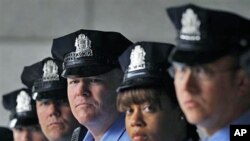In confirming the death of its leader, Osama bin Laden, the terrorist group al-Qaida is threatening more attacks against the United States and its allies. And top U.S. security officials say they are on alert for possible terrorist retaliation attacks. While the U.S. Department of Homeland Security has not issued specific terror warnings, law enforcement agencies have heightened security around the country to guard against attacks by al-Qaida-affiliated groups or by terrorists acting on their own.
Law enforcement agencies across the United States have stepped up patrols at travel hubs and government facilities, following warnings that Osama bin Laden's death might inspire home-grown extremists.
"You're not going to have 19 hijackers taking down aircraft, but kids trying to find AK-47s or buy handguns or buy hand grenades on the street and go do something at a commercial facility like a mall or a 7-11 [convenience store]," said Philip Mudd, a former CIA officer and FBI counterterrorism agent.
Analysts say authorities have stopped 38 terrorism plots in the United States since September 11, 2001. And U.S. officials say documents seized from bin Laden's compound in Pakistan showed al-Qaida considered attacks against trains in the U.S. this coming September 11th. Al-Qaida-affiliated groups have been linked to rail transport attacks in Europe.
Just a year year ago, a Pakistani-born U.S. citizen - Faisal Shahzad - tried to set off a car bomb in New York's Times Square. And Najibullah Zazi, an Afghan who has been in the U.S. since 1999, attempted to bomb New York City's subway system in 2009.
James Carafano, a national security expert with The Heritage Foundation in Washington, says security officials are keeping a close eye on al-Qaida-affiliated groups.
"The U.S. has always been concerned about al-Shabab, that is a group based in Somalia," he said. "They have links to the Somali community in the United States. They are a declared enemy of the United States and a supporter of al-Qaida. We have also been very concerned about 'LeT' - Lashkar-e-Taiba - which is a group based in Pakistan, which launched the horrifying [2008] attacks in Mumbai."
Counterterrorism experts say a group based in Yemen, al-Qaida in the Arabian Peninsula, might try to stage an attack. The group is linked to radical cleric Anwar al-Alawki, an American believed to have ties to the failed 2009 Christmas Day plot to blow up a U.S.-bound jetliner, and a scheme to plant parcel bombs on U.S. cargo flights last November.
Tim Starks, who covers intelligence and homeland security issues for "Congressional Quarterly," says bin Laden's followers target transport facilities.
"They definitely have a tendency to go back to the targets that they know. those are targets that are easy to plot against in some ways. You don't have to have a lot of sophisticated efforts to go after them."
Analysts say the U.S. remains vulnerable to terrorist attacks, but the best way to protect the country is not adding more layers of security, it is stepping up intelligence efforts before terrorists can attack.




